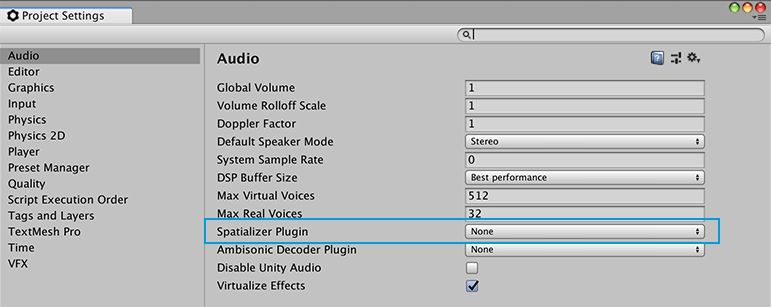VR Audio Spatializers
Unity natively supports Audio SpatializersA plug-in that changes the way audio is transmitted from an audio source into the surrounding space. It takes the source and regulates the gains of the left and right ear contributions based on the distance and angle between the AudioListener and the AudioSource. More info
See in Glossary for virtual realityA system that immerses users in an artificial 3D world of realistic images and sounds, using a headset and motion tracking. More info
See in Glossary (VR) projects. Audio Spatializers change the way audio is transmitted from an audio sourceA component which plays back an Audio Clip in the scene to an audio listener or through an audio mixer. More info
See in Glossary into the surrounding space: the plugin takes the source and regulates the gains of the left and right ear contributions based on the distance and angle between the AudioListener and the AudioSource.
Enable these plugins through the Audio settings (menu: Edit > Project Settings, then select the Audio category) using the Spatializer Plugin dropdown menu. The native plugins can be used with or without VR mode enabled.

The spatializer plugins only work on the platforms that a VR device is supported on. If a device is not supported for a build target, Unity displays a warning that the plugin will not be included in the built application.
Every plugin works in the Editor for testing purposes.
Natively included Spatializer plugins:
- OculusA VR platform for making applications for Rift and mobile VR devices. More info
See in Glossary Spatializer (supports Android, OSX, and PC) - Microsoft HRTF Spatializer (supports UWP and PC running Windows 10)
Did you find this page useful? Please give it a rating: